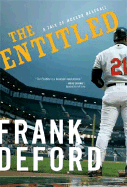
 Howie Traveler is a fifty-something minor league coach who once had a shot at being a player but wasn't quite good enough. He has spent his career managing in the minors and coaching in the majors. Finally given a shot as a big league manager with the Cleveland Indians, he has a few big league problems. First, he has to figure out how to manage his slugger Jay Alcazar, perhaps the best player in baseball. Off the field, he's also a star--a handsome, charismatic man who cuts a swath with ease and has an ego to match his prowess. Howie also thinks he's about to lose his job midway through his second season with the team. Given his background, this would mean the end of his life in baseball, the only life he's ever known. Although Howie still felt the pain of what might have been, "nothing satisfied him so much as to watch the players who did possess the talent he had almost had . . . he loved watching [the game] being played well."
Howie Traveler is a fifty-something minor league coach who once had a shot at being a player but wasn't quite good enough. He has spent his career managing in the minors and coaching in the majors. Finally given a shot as a big league manager with the Cleveland Indians, he has a few big league problems. First, he has to figure out how to manage his slugger Jay Alcazar, perhaps the best player in baseball. Off the field, he's also a star--a handsome, charismatic man who cuts a swath with ease and has an ego to match his prowess. Howie also thinks he's about to lose his job midway through his second season with the team. Given his background, this would mean the end of his life in baseball, the only life he's ever known. Although Howie still felt the pain of what might have been, "nothing satisfied him so much as to watch the players who did possess the talent he had almost had . . . he loved watching [the game] being played well."The night he realizes he's getting the axe, as he's walking down the hallway to his hotel room, he sees Alcazar's door open with a bang, a woman run out, and Alcazar grab her, haul her back in and kick the door shut. Howie is stunned, but listens only for a minute, doesn't hear any noise and goes to his room. He rationalizes his behavior, but realizes that he failed: "when he was tested by a moment . . . he had found out who he was." The next day, the woman files charges. Alcazar says it was a set-up, and Howie denies to the cops that he saw anything. He doesn't know why he lied--to protect Jay Alcazar? To protect the team? Or because Jay Alcazar had momentarily saved Howie's job by getting himself arrested?
The novel cuts between the present and the past, between Howie's life and Jay's. The minor characters are a treat, like Ty Baggio, the number one pitcher, a southpaw, who labels baseball situations using TV weather report terminology: hot streaks are "heat waves," a bad inning is "a cold front blowing through," the gloomy relief pitcher is "lingering showers," the optimistic first-baseman Wyn'amo Willis is "sunshine, punctuated by rainbows." Harold Moncrief, the Indians exec, is a statistics freak (and therefore "Record Temperature" in Baggio-speak), whose favorite word is "fungible." And Mickey Huey, an old columnist for the Plain Dealer, is someone you'd want to have a drink with.
Frank Deford fills his book with baseball lore, baseball history and baseball knowledge, some of it pleasingly eccentric (as it should be). And Deford, as any sports reader or NPR listener knows, is quite funny: "Christian ballplayers were always so cocksure, which made Howie envious of them. If you were that damn certain of Jesus, you could also be pretty damn confident looking at an oh-two pitch." He is less sure-handed at writing about women--the alleged rape victim is a bank manager, but when she says "cripes" and "I'm not blowin' you any smoke," it brings to mind a tough little secretary from a Spillane novel. Criminy. The denouement is also a bit awkward, but the ending is almost beside the point. The game is central, and Howie is a beautifully realized character, lovingly and honestly drawn. Like a baseball game, The Entitled is well-paced and thoughtful, with just enough action and adrenaline. This story of old school meeting the modern game is, as Howie might say, an altogether good read.--Marilyn Dahl

